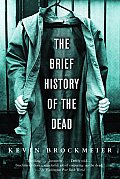 In an interview last year with Granta magazine, Kevin Brockmeier was asked about the premise of his highly acclaimed novel, The Illumination (2011), in which human suffering and pain become visible. Brockmeier cites G.K. Chesterton’s The Poet and the Lunatics in his response, “[Chesterton] says of St. Peter that, dying upside down, he ‘saw the landscape as it really is: with the stars like flowers, and the clouds like hills, and all men hanging on the mercy of God’ ”
In an interview last year with Granta magazine, Kevin Brockmeier was asked about the premise of his highly acclaimed novel, The Illumination (2011), in which human suffering and pain become visible. Brockmeier cites G.K. Chesterton’s The Poet and the Lunatics in his response, “[Chesterton] says of St. Peter that, dying upside down, he ‘saw the landscape as it really is: with the stars like flowers, and the clouds like hills, and all men hanging on the mercy of God’ ”
“[M]y instinct,” Brockmeier continued in the same interview “is that the great big real world of sensations and objects and other people’s minds is already deeply strange, but sometimes it takes a change of perspective for us to see it clearly.”
One can safely say that Brockmeier’s work is a study in turning the known world inside-out and upside-down. In his first novel, The Truth About Celia, Brockmeier introduces us to a grief-stricken father whose seven-year-old daughter suddenly, and inexplicably, disappears one day. The father, himself a science-fiction writer, visits and re-visits the tragedy from one achingly-imagined perspective after another, including those of a pedophile, a ghost-child, and a young girl trapped suddenly in a different dimension. Each possibility forms one more stone along a quietly devastating trail of unbearable grief.
In his second novel, A Brief History of the Dead, we are introduced to “the City,” where the dead reside until they are no longer remembered by the living. The City expands and contracts according to the needs, and number, of its residents, several of whom we follow through a sudden surge and emptying that corresponds to a deadly virus sweeping the earth. Finally, the only people left are those remembered by the single human left living, a woman scientist trapped at an Antarctic research station.
The novel has been described as a meditation on not only the resilience of memory, but its power to shape our world. Though the City itself is a world touched by the fantastic – a giraffe’s spots might detach, for example, and hover above the street as people sit beneath them sipping coffee – its foundations lie in the very real, sometimes passing, human connections whose importance we often fail to notice.
Brockmeier still lives in Little Rock, Arkansas, where he was born and raised. He earned his MFA from the Iowa Writers’ Workshop in 1997 and has taught there. In addition to the novels mentioned above, Brockmeier has written the children’s novels City of Names and Grooves: A Kind of Mystery, and the story collections Things That Fall from the Sky and The View from the Seventh Layer. He has published stories in The New Yorker, The Georgia Review, McSweeney’s, The Best American Short Stories, and The Year’s Best Fantasy and Horror. He has received three O. Henry Awards (one, a first prize), the PEN USA Award, and an NEA Grant. Recently he was named one of Granta magazine’s Best Young American Novelists,
Links for the full interviews quoted above:
Granta: Interview with Kevin Brockmeier
Fiction Writers Review: Kevin Brockmeier









